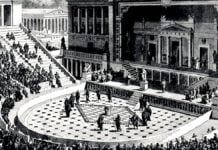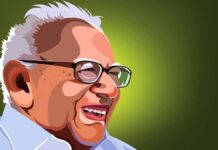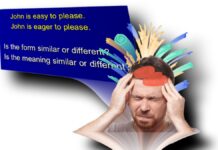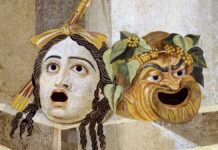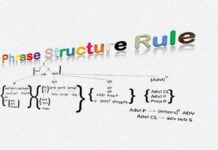Epic theatre, also known as epic drama, is a theatrical genre that emphasises narrative, grand scale, and a combination of theatrical elements to create an immersive and thought-provoking experience. Developed in the early 20th century, it is closely associated with German playwright and director Bertolt Brecht and his techniques aimed at encouraging critical thinking and social change.
Epic theatre emerged in response to the political and social upheavals of the early 20th century. Influences include Marxist theory, Russian Constructivism, and traditional Chinese theatre, which Brecht admired for its didactic and non-naturalistic qualities. He founded the Berliner Ensemble, where he developed and showcased his theories and practices.
Epic theatre does not refer to the scale or scope of the work but rather to its form. It emphasises the audience’s perspective and reaction to the piece through various techniques that deliberately cause them to engage differently. The term “epic theatre” comes from Erwin Piscator, who coined it during his first year as director of Berlin’s Volksbühne. Piscator aimed to encourage playwrights to address “contemporary existence” issues.

Characteristics
Narrative Focus
Epic dramas often feature complex stories with multiple characters and subplots, spanning long periods and various locations.
Didactic Purpose
The primary goal is to educate and provoke critical thought rather than merely to entertain. Themes often explore social, political, and economic issues.
Alienation Effect
Techniques are used to prevent the audience from becoming emotionally absorbed in the narrative. This includes direct address, breaking the fourth wall, and using placards or projections to provide context or commentary.
Non-linear Structure
The narrative may not follow a chronological order, incorporating flashbacks, flash-forwards, or episodic storytelling to highlight different aspects of the story.
Music and Songs
Songs and music are integral to epic drama. They comment on the action, express themes, or provide a break from the narrative. These elements often juxtapose the tone of the scenes.
Multimedia Elements
Multimedia, including film, slides, and projections, enhances storytelling and provides additional layers of meaning.
Minimalist Staging
Sets and props are often minimalistic and symbolic, emphasising the theatricality of the performance and focusing attention on the message.
Direct Audience Engagement
Actors may address the audience directly, encouraging them to reflect on the issues presented rather than losing themselves in the story.
Techniques
Direct Address
Actors speak directly to the audience, breaking the illusion of reality and encouraging reflection on the themes.
Narration
Using a narrator or narrative interludes to provide context, commentary, and connections between scenes.
Gestus
A combination of gesture and social attitude, where actors use physicality to convey character and social context.
Placards and Projections
Visual elements like signs, projections, or multimedia provide information, commentary, or highlight themes.
Functions and Impact
Social Critique
The epic drama is a powerful tool for social critique, questioning and challenging societal norms and injustices.
Encouraging Active Viewership
By preventing emotional absorption, epic drama encourages the audience to think critically and engage with the content intellectually.
Influence on Modern Theatre
Epic drama has significantly influenced contemporary theatre, with its techniques and principles being adopted and adapted by numerous playwrights and directors.
Notable Works
- Mother Courage and Her Children by Bertolt Brecht
- The Threepenny Opera by Bertolt Brecht
- The Life of Galileo by Bertolt Brecht
- Hamletmachine by Heiner Müller
- Angels in America by Tony Kushner
Epic theatre is a genre that blends narrative complexity, didacticism, and innovative theatrical techniques to create a unique and impactful form of theatre. Its emphasis on critical engagement and social critique challenges audiences to think deeply about the issues presented and consider their role in effecting change. Bertolt Brecht’s legacy and epic theatre continue to resonate in modern theatre, inspiring new generations of artists and audiences.















